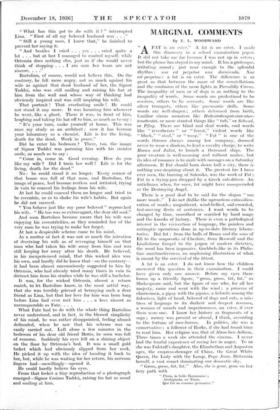MARGINAL COMMENTS
By E. L. WOODWARD
FAT is an ester." A fat is an ester. I made this discovery in a school examination paper.
It did not take me far because I was not up in esters ; but the phrase has stayed in my mind. It has a grotesque, irritating sound ; just near enough to the splendid rhythm : why est popetua una dormienda. Nox est pelpetua : a fat is an ester. The difference is as great as that between the maze of the constellations and the confusion of the neon lights in Piccadilly Circus. The inequality of men or of dogs is as nothing to the inequality of words. Sonic words are predestined to be masters, others to be servants. Sonic words are like silver trumpets, others like pneumatic drills. Some words are well-shapen ; others deformed from birth, familiar circus monsters like Hottentottenpotentatentan- tenattentat, or mere stunted things like "tub," or &lured, or Pflug. There are blind and deaf words, cool words like " reverberate " or "forest," violent words like "black," "steel," or "wasp." "Fat " is one of the words thrown always among low company, doomed never to wear a diadem, to lead a cavalry charge, to write Romeo and Juliet, to launch a thousand ships. The poor creature is well-meaning and without malice, but its idea of romance is to sizzle with sausages on a Saturday afternoon. If Fat should burn down half a city, there is nothing awe-inspiring about it. The greatest lire I have ever seen, the burning of Salonika, was the work of Fat : Fat in a frying-pan dropped by a Greek cab-driver. An anticlimax when, for once, fat might have masqueraded as the Destroying Angel.
There is a good deal to be said for the slogan "use more words." I do not dislike the uproarious entassifica- cation of words ; magnificent, wind-bellied, sail-crowded, fast-moving fleets of sentences. I want words to be changed by time, smoothed or scarified by hard usage and the knocks of history. There is even a pathological interest in the vivisection of language, the painless and antiseptic operations done in up-to-date literary labora- tories. But fat : from the bulls of Basan and the sons of Eli to the soapworks of Cheshire, from Beowulf and the Lindisfarne Gospel to the jargon of modern dietetics, the word has been impassive, Goebbels-like in its Philis- tine unattractiveness, an unpleasing illustration of what is. meant by the survival of the fittest.
• A fat is an ester. I do not know how the children answered this question in their examination. I could have given only one answer. Before my eyes there looms up a friendly figure, "gross, gross, fat, fat," as Shakespeare said, but the figure of one who, for all her majesty, came and went with the wind ; a princess of charwomen, a gipsy with the gipsics, a fishwife among the fishwives, light of hand, beloved of dogs and cats, a mis- tress of language to its darkest and deepest recesses, a woman of moods and imperiousness, an ester, if ever there were one. I know her .history as fragments of a saga ; money was present or absent, I think, according to the fortune of race-horses. In politics, she was a conservative ; a follower of Burke, if she had found time to read him. Her religion was that of Abou-ben-Adliem. Three times a week she attended the cinema. I never had the fearful experience of seeing her in anger. To us she was Falstaff's daughter, the Elizabethan and Augustan ages, the empress-dowager of China, the Great White Queen, the Lady with the Lamp, Pope Joan, Britannia herself, a vast comet dominating our domestic sky.
"Gross, gross, fat, fat." Alas, she is gone, gone on her fiery path with
"Flora, la belle Rommaine ; Archipiada, ac Thais, Qui fut sa cousine germaine."










































 Previous page
Previous page